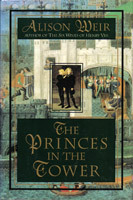Your rating:
Despite five centuries of investigation by historians, the sinister deaths of the boy king Edward V and his younger brother Richard, Duke of York, remain two of the most fascinating murder mysteries in English history. Did Richard III really kill “the Princes in the Tower,” as is commonly believed, or was the murderer someone else entirely? Carefully examining every shred of contemporary evidence as well as dozens of modern accounts, Alison Weir reconstructs the entire chain of events leading to the double murder. We are witnesses to the rivalry, ambition, intrigue, and struggle for power that culminated in the imprisonment of the princes and the hushed-up murders that secured Richard’s claim to the throne as Richard III. A masterpiece of historical research and a riveting story of conspiracy and deception, The Princes in the Tower at last provides a solution to this age-old puzzle.Look for special features inside.Join the Circle for author chats and more.RandomHouseReadersCircle.com
Publication Year: 1995
No posts yet
Kick off the convo with a theory, question, musing, or update
Your rating:
I'm going to make a couple disclaimers right now:
If you think that Richard III is the best most misunderstood man to ever exist; that he never did anything wrong, never had any ambition, and was most definitely not capable of violence or infidelity; this book is not for you. Move on. Open another screen. Re-read "The Sunne in Splendour" for the fiftieth time (because I've heard that one is rather sympathetic, if fictional).
Furthermore, I should probably add that although I share her opinion of Richard's guilt (though my theory is more of a "probably" than certainty) I don't necessarily think that Alison Weir is the best historian. When it comes to set-in-stone facts, she knows her stuff. However, she is at the end of the day a popular historian vs. an academic historian, and her personal opinions often bleed into her research. "The Princes in the Tower", though interesting and informative, is especially colored by Weir's opinions.
"The Princes in the Tower" features plenty of contemporary sources, and some popular ones that everyone should read about even if they don't necessarily agree with them. Weir strongly believes that Richard III ordered the murders of his nephews; I agree, though far less strongly. You can feel her passion seeping off of the pages. But that, as it so often does with Weir, corrupts the objectiveness of the book. In fact, it's basically the opposite of objective, which endangers its credibility.
Really, "The Princes in the Tower" would have benefited from more of a detached perspective on Richard's character, which is so arguable. We don't know much about who the guy was. Yet Weir seems to think that he would do the absolute worst thing in every situation--without allowing that so often, what seems like the absolute worst thing to a modern audience actually wasn't so implausible to a fifteenth century politician. Perhaps Richard was capable of murdering his nephews; but did he really pick the most evil option every time just for the sake of being evil?
I also tend to think that it was quite possible that Richard considered marring his niece, Elizabeth of York. Yet Weir backs the theory that Richard and Elizabeth had an affair with very little backing. Her opinions weren't always completely implausible--they just needed more evidence. She doesn't prove her case.
Nonetheless, the book gives a lot of interesting, unquestionable information that makes you wonder and do further research. It's not a must-read, and I tend to think that it's for someone who's already done a little research on the subject beforehand. But if you're looking for a controversial opinion on Richard III--and one that doesn't fawn over him as if he was the second coming--it's definitely up your alley.
